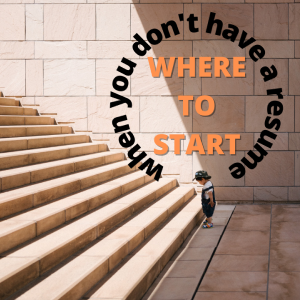You don’t have a resume. There are all sorts of reasons for not having a resume: just starting on your career journey, having been in a career that required a CV and not a resume, or having worked but just never needing a resume.
So now that you need a resume, where do you start?
The first step in writing a resume is NOT to start writing the resume. I know, you want to jump right in, but here’s what you need to do instead – gather information.
Take a few minutes to list the roles and companies you worked at and the information around your education. Even if you have no formal work experience, you still have experience. Think about classes you’ve taken, projects you’ve worked on, times when you’ve volunteered, and organizations you’ve been a part of.
If you do have formal work experience, for each role you’ve had, think about what you accomplished. Note any challenging situations you were in and how you handled it. If you received positive feedback, note that too. Win an award? Boom. Add that too. If your role had results that can be quantified – think numbers – note those as well. A word of caution – when you write your resume only share the data and information that is publicly available.
When thinking about your education, what subjects did you find most interesting? Note any projects you worked on. If you received any honors, awards, or recognition write that down. Make a list of the extracurricular activities you were a part of. Sports, clubs, honor societies, volunteer work and the like should go on the list.
Look over your roles and activities. What did you learn? How did you grow?
The above applies to everyone who doesn’t have a resume. Your next step depends on your situation, so let’s break these down.
You are just starting your career
No one expects you to know very much at this point. The value you can add is not the same as the value someone with 20 years of experience can add. The value you bring is the potential to learn, the potential to ask great questions, and the potential to contribute to the success of the organization.
What a hiring manager needs to know is if you are dependable, curious, and excited to contribute. Look through your list of activities, projects, and experiences and find examples of being dependable, curious, and excited to contribute. Examples include being on time, having good attendance, and initiating independent study/learning.
You have a CV
You have a potentially long list of activities you’ve authored or participated in. The content of a resume is a selection of highlights from your career that show you are the best candidate for the role you are applying for. A well-written resume shows what you were responsible for and what you accomplished. Think about the context of your work, challenges you faced, and how you overcame the challenges. Employers want to understand how you added value in the past so they can predict how you will help their organization succeed.
You have a career, but you just never needed a resume
You’ll need to think about the responsibilities and accomplishments for each role you’ve held and how these support your claim as the best candidate for the role you are applying for. If you have been at several companies over a long period of time, determine if those experiences are relevant to the role you are applying for. If not, consider leaving those off your resume. You may also add context about each company you’ve been at, such as how large of an organization they are, to help the hiring manager or recruiter better understand your contributions.
Starting with gathering information will put you in a good position to start writing your resume and positioning yourself as the best candidate for the role that’s a great fit for you!
